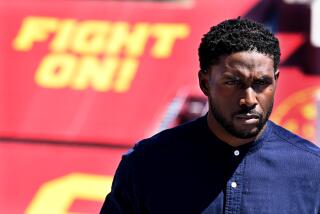NCAA settles expense suit
The NCAA has reached a tentative settlement in a lawsuit brought by athletes who claimed their full scholarships failed to cover all the costs of attending school, agreeing to create a $10-million fund for former athletes’ educational expenses and ease access to $218 million in existing funding for current athletes.
By some estimates, damages in the class-action suit filed in 2006 by Stanford football player Jason White, San Francisco basketball player Jovan Harris and UCLA football player Brian Polak could have reached $345 million. Texas El Paso basketball player Chris Craig was added as a plaintiff later.
Stephen E. Morrissey, an attorney for the plaintiffs, said Wednesday the former athletes were “pleased” with the proposed settlement.
But former UCLA football player Ramogi Huma, who earlier worked as a paid consultant to the plaintiffs’ attorneys in the class-action suit and is the founder and president of the National College Players Assn., called the settlement “unacceptable,” saying the $218 million is “not new money,” and the $10 million is “a drop in the bucket.”
Ellen Staurowsky, a professor of sports management and media at Ithaca College in New York, said the more than 12,000 Division I football and men’s basketball players represented in the lawsuit seem to have “gotten very little out of this settlement in reality.”
The $218 million, which athletes would apply for under new guidelines, is earmarked only through 2013 and the expiration of the $6-billion CBS contract to televise the NCAA tournament.
“In the absence of knowing how this would be financially sustained over time, I’m not sure if the athletes’ concerns are being addressed, long-term,” she said.
NCAA general counsel Elsa Cole said the NCAA “has a commitment in its own rules to continue distribution” of funds to needy athletes after the current media deal ends.
Allowable uses, Cole said, might include a computer, travel expenses for a family member’s funeral, apparel and other “basic needs.” College administrators would decide what qualifies, Cole said.
A U.S. District Court judge in Los Angeles is expected to give preliminary approval to the settlement agreement Monday, Cole said, and funds could begin to flow to Division I athletes with demonstrated need during the summer.
The NCAA denies that it violated any laws but agreed to the settlement “to avoid the substantial expense, inconvenience and distraction of continued litigation,” according to the proposed agreement.
The settlement would end the latest in a series of high-profile suits challenging the NCAA.
In 1999, the NCAA agreed to pay $54.5 million in a settlement with so-called restricted earnings coaches -- assistant basketball coaches whose salaries were limited to $16,000 annually by the NCAA.
In 2005, it settled an anti-trust suit by paying $56.5 million to buy the preseason and postseason National Invitation tournaments.
Steven Sklaver, a plaintiffs’ attorney, said the money made available by the NCAA would help current and future athletes “bridge the gap between their scholarships and what it really costs” to attend a college or university.
Huma, the head of what he said is a 6,000-member athletes’ organization, said the agreement is less than he hoped for, complaining that it does not require the NCAA to distribute the funds, only to make them available, and that no public accounting is required.
“The $10 million, I think, is a step in the right direction as far as the purpose of giving money to players who have not yet graduated and want to come back. But $10 million is a drop in the bucket. A person can get $2,500 a year. What college do you know that’s $2,500 a year?”
--
More to Read
Go beyond the scoreboard
Get the latest on L.A.'s teams in the daily Sports Report newsletter.
You may occasionally receive promotional content from the Los Angeles Times.










